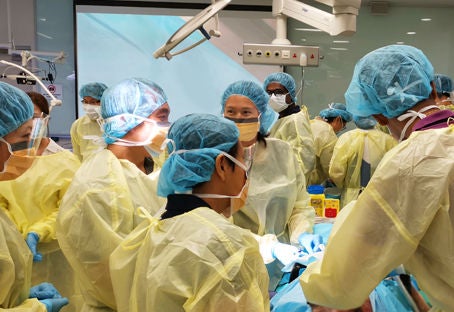HealthXchange will NEVER ask you to transfer money over a call. If in doubt, call the 24/7 ScamShield helpline at 1799, or visit the ScamShield website at www.scamshield.gov.sg.

Over the years, technology has improved by leaps and bounds to become an important training tool in healthcare. Learning for the medical professions has evolved from traditional book learning to using technological innovations like manikins, which can simulate patients' symptoms and reactions to help learners to hone their clinical skills. Yet for all its advancements, there remain certain things that technology can't teach.
"In recent years, we have been using manikins in Emergency Medicine training to develop our clinicians' procedural skills. But manikins can only offer a limited degree of realism, especially when our learners are practicing certain high-risk and rare procedures like ED thoracotomy and cricothyrotomy." Assoc Prof Evelyn Wong, Senior Consultant, Emergency Medicine, Singapore General Hospital, and Course Director for Advanced Critical and Emergency Procedures Course (ACE-PRO) explains. "We therefore needed another teaching tool, which could more closely simulate and support the training of such essential skills."
With that in mind, SIMS conducted ACE-PRO in May 2019 but with a twist – using cadavers or 'silent mentors' instead of manikins, a first for Emergency Medicine training in SingHealth. 'Silent mentors' offer near-realism of the human anatomy, allowing for the practice of critical and emergency procedures in a safe and supervised environment. Over 15 Emergency Medicine doctors from the various healthcare clusters in Singapore attended the workshop, which covered the educational techniques and processes behind using 'silent mentors' to teach advanced emergency procedures.
"Cadaveric workshops in Emergency Medicine are rare to come by," Dr Elaine Tan, Senior Consultant, Changi General Hospital, and course participant, shared. "During the workshop, I was able to perform rarely or never performed procedures in real life, such as laparotomy (as proxy for a perimortem C-section). It definitely increased my confidence in performing similar procedures in future."
"The use of 'silent mentors' in procedural skills training for Emergency Medicine training offers a more realistic tactile feel when performing the procedure, which cannot be obtained from books or simulators. While it cannot exactly replicate doing the procedure on a real patient – having that opportunity to practise could make a difference to future patients." Dr Tan said.
 |  |
| ACE-Pro participants hearing from main master trainer, Dr Eric Gross, Clinical Professor, Department of Emergency Medicine, University of California, Davis, USA | ACE-Pro Participants from the May 2019 run |
Find out how SIMS has been helping healthcare professionals develop their competencies and confidence for better patient care! Read the latest simulation stories here.
Get the Health Buddy App
© 2025 SingHealth Group. All Rights Reserved.













 Get it on Google Play
Get it on Google Play